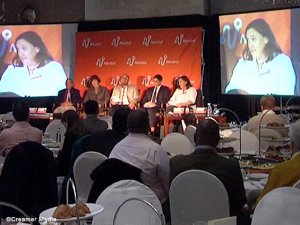South Africa would have to continue to find ways to support teachers and schools, provide strong primary school education and increase the country’s pool of mathematics specialists who taught at that level, University of the Witwatersrand’s (Wits’) School of Education lecturer Lynn Bowie said on Wednesday.
Speaking at a mathematics and science development breakfast, in Johannesburg, she indicated that the vast majority of people’s maths requirements post school were fairly basic.
“That is where we are still getting things wrong, primary school is where our focus should be.
“If we can teach basic mathematical ideas [at primary school level] in a way that is deep and connected; if kids can come out with an understanding that is profound and flexible and they are able to use maths in what they do, then we will really start preparing them for life outside of the classroom,” Bowie put forward.
She commended the Department of Basic Education and the Gauteng Education Department for shifting their focus from matric exams to getting these fundamentals in place at primary school level.
“My plea is that we must continue to get that right.”
In determining the reason for South Africa producing substandard teachers, Bowie noted that the country would need to consider who was being attracted into the profession, as many individuals who were pursuing a career in mathematics and science teaching had a backlog in terms of their knowledge in these subjects.
She urged that strong leadership to lead and support teachers would be required to turn South Africa’s education system around.
Gauteng MEC for Education Barbara Creecy highlighted that, of the province’s 2 300 public schools, 1 200 had been identified as underperforming, as they were not meeting the pass target set by The Presidency.
“While Gauteng does not necessarily have a shortage of teachers…we do find that we have teachers that do not have adequate curriculum knowledge,” she pointed out.
This contributed, in part, to the Development Bank of Southern Africa’s findings in its Education Roadmap that South African schools were only covering about 60% of the curriculum.
Creecy said the Guateng department had put various programmes in place to improve the province’s education system, including in-service training and supplying teachers with standardised lesson plans.
She added that language barriers were amplifying the country’s poor performance in mathematics and science.
“There is a close relationship between teaching mathematics and teaching a language, because the other problem children face is that they do not have fluency in the language of instruction… it is a cognitive language problem.”
Further, one of the contributing factors to why children were not choosing mathematics and science at senior-secondary level was that they did not understand that these subjects were gateway learning subjects, which they would require to study disciplines such as medicine, accounting and science.
Meanwhile, telecommunications group Neotel MD and CEO Sunil Joshi said it would be challenging to reach the targets set out in government’s National Development Plan 2030, which aimed to increase the number of learners passing matric each year to 80% from the current 73.9% and raise the number of those taking part in tertiary education from the current 17% to about 30%.
“We have seen improvements in 2012 in terms of pass marks; people are passing at a rate of almost 74%, but still there is a vast population of schools that do not have teachers. We are short of about 2 800 mathematics teachers and about 2 500 science teachers, especially in the 15 000 to 16 000 schools that are government-funded,” he stated.
Joshi further noted that, although it was easy to connect schools in term of information and communications technology (ICT), schools would have to be equipped with proper content to impart education in a structured way.
“The challenge we face is to enthuse teachers to learn ICT skills to be able to leverage the structured mathematics and science laboratory framework that can be imparted on learners,” he highlighted, adding that teachers’ skills sets would have to become more relevant to South Africa’s requirements.
Mapungubwe Institute for Strategic Reflection senior researcher Graeme Bloch agreed that South Africa would urgently have to improve its educational system.
“Whether you look at the Teacher Information Management System for an international standard…or our own annual assessment, our children cannot read or write properly,” he advised.
Bloch urged that the country would have to draw on its resources and experience in the form of mathematics and science centres, such as the Sci-Bono Discovery Centre, in Johannesburg, as well as those at Wits and in Kwa-Zulu Natal and the Free State.
Bloch said Africa’s HIV/Aids and malaria pandemic also called for more local scientists.
“If we are going to wait for the US and Europe to fix it we will wait a long time.”
Bloch said South Africa required an effective plan to tackle its education challenges, “but government has yet to communicate one”.
He added that schools and districts needed to draw in more help and that nongovernmental organisations would have to collaborate more and inform themselves of what is required to alleviate the situation.
EMAIL THIS ARTICLE SAVE THIS ARTICLE
To subscribe email subscriptions@creamermedia.co.za or click here
To advertise email advertising@creamermedia.co.za or click here










